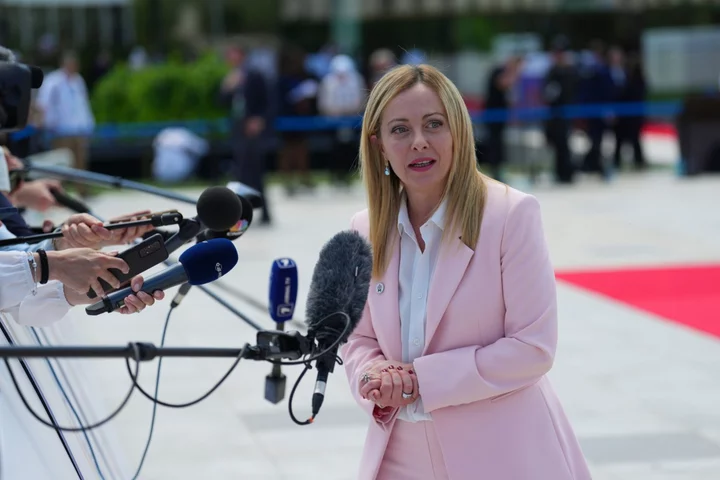Italian Prime Minister Giorgia Meloni vowed to grant Tunisia $750 million in aid and to back it in its negotiations with the International Monetary Fund over a crucial bailout.
The announcements, after talks Tuesday with Tunisian President Kais Saied, indicate the importance of the troubled North African country, which is a major embarkation point for illicit migration across the Mediterranean.
Avoiding an economic meltdown in Tunisia is a priority for Meloni as the birthplace of the 2011 Arab Spring uprisings continues to struggle following its revolution. Further turmoil would risk spurring yet more migration — heaping pressure on the right-wing leader on an issue that was pivotal to her 2022 electoral success.
Italy plans to open €700 million ($748 million) in credit lines to mostly support vital services such as healthcare, Meloni said in remarks posted on the Tunisian presidency’s Facebook page. Italy will also seek to “bridge viewpoints” between the IMF and Tunisia during an international conference around the issue of irregular migration to be held in Rome, she said without specifying a date.
“The approach has to be pragmatic so that we can help Tunisia,” she said.
During his meeting with Meloni, Saied renewed his rejection of what he termed diktats in the talks with the IMF, warning they could ignite instability in Tunisia and beyond. He raised with Meloni the idea of debt relief through the conversion of Tunisian debt into “private development projects”, according to the presidency.
“Those who provide ready-made prescriptions are like a doctor who prescribes the medicine before diagnosing the disease,” he said.
While IMF assistance is seen as key to shoring up an economy battered by soaring prices and high youth unemployment, the Tunisian government has yet to finalize the wide-ranging reforms, including potentially painful cuts in state spending, necessary to secure a final deal.
Tunisia, where Saied is accused by opponents of trying to restore one-man rule after assuming greater powers in 2021, has been a major staging point for illicit crossings, both by Tunisians and others from the continent.
The migration issue is “worsening by the day” and calls for an international dialogue, Saied said, blaming lawless foreign migrants and what the presidency termed “organ- and human-trafficking criminal gangs in sub-Saharan Africa and northern Mediterranean countries” for the surge in crossings.
“The roads no longer lead to Rome alone, they now also lead to Tunis,” he said, stressing how some foreign migrants elect to stay in Tunisia instead of using it as a springboard to Europe.
Italy’s migration policy has been criticized by other European nations. French Interior Minister Gerald Darmanin said last month that Meloni’s cabinet was “incapable of fixing Italy’s migration problems,” rekindling a diplomatic row between the two countries.
Read More: Italy and France, Old Frenemies, Are Squabbling Ahead of G-7
At least 23,091 migrants were intercepted while trying to illicitly cross by boat from Tunisia to Italy between January and May this year, according to FTDES, a Tunisian non-governmental organization. About 3,430 Tunisians reached Italy, including 865 minors, while 534 people died in attempts, the data show.
(Recasts with aid starting in first paragraph.)

